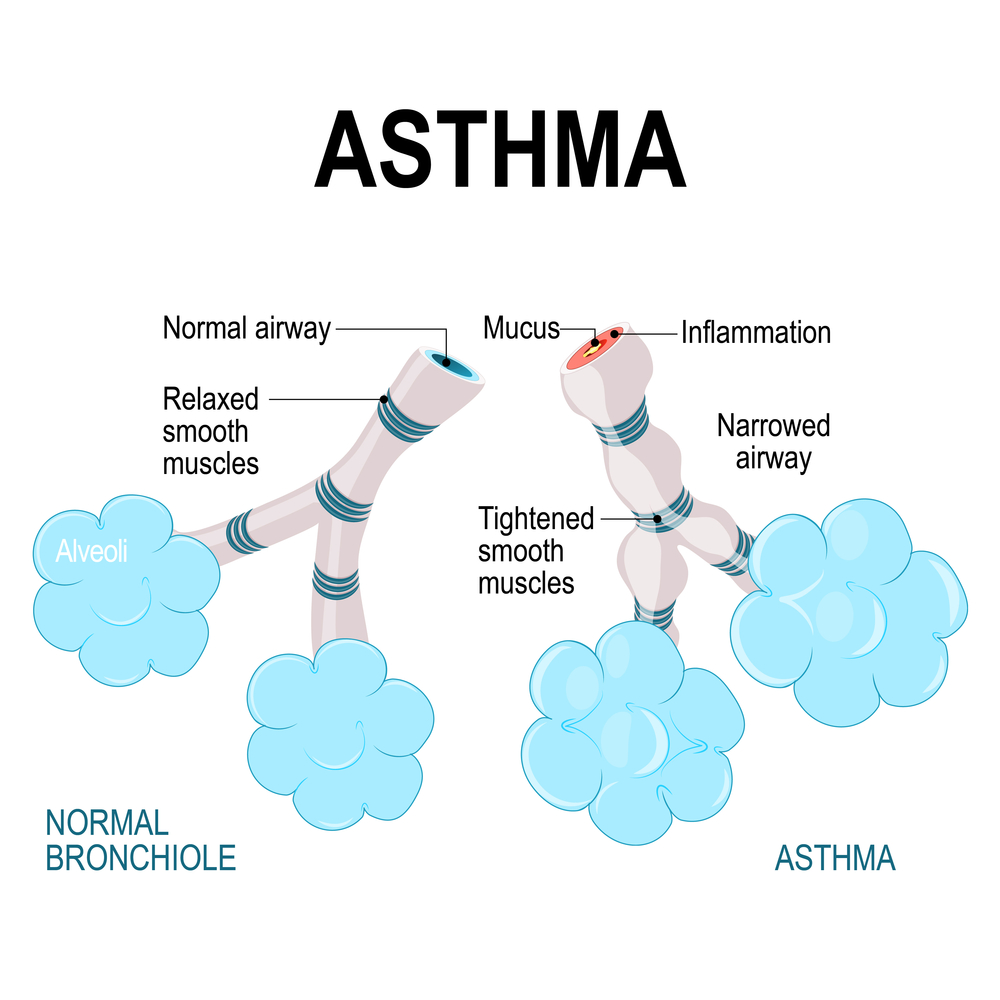Have Asthma? Cut Back on Sugar!
Sugar might do a lot more than just plumping up our kids, it could also trigger asthma as what most researchers suggest.
The Centers for Disease Control and Prevention (CDC) estimate that approximately 18.4 million adults in the US have asthma. An additional 6.2 million US kids are also living with this condition.
Asthma involves two main components – constriction of the airway muscles and inflammation. These reactions cause narrowing of the airways resulting in symptoms like coughing, chest tightness, difficulty breathing, and wheezing.

Asthmatic patients, when exposed to a trigger, will have a flare-up. This is a common scenario in November and December when holiday parties and cookie exchanges abound. So just when you have to be in tip-top shape to survive the busy activities that the festive season brings, you are down with another bad bout of asthma. For you to enjoy the holidays healthily, you have to know and understand what could possibly cause these flare-ups.
Contents
Common Asthma Triggers
Two of the most common contributing factors of asthma are sugar and gluten. The connection to why most asthma patients experience attacks during the holidays is that most of them tend to consume more goodies during this time of the year. It is never easy to resist cookies, chocolates, pumpkin pies, apple crisps, and peanut brittles, right? There are just too many holiday treats everywhere and most of them are a combination of sweets and gluten.
Aside from these favorite foods, what you drink can also have an effect on your asthma. Of course, you’ll consume excess sugar from beverages. Your favorite glass of wine of a bottle of beer can range from 4-8 teaspoons, and that is if you can stop at just one!
Researches That Tested The Theory
Poor eating habits, including excessive consumption of sweets, are among the several factors to be blamed, says Sonja Kierstein of the Nestle Research Center in Switzerland.
Kirstein and her team hypothesized that a high sugar diet may cause inflammation of the airways. They performed a study at the University of Pennsylvania, which was presented at the yearly meeting of the American Academy of Allergy, Asthma, and Immunology and published at WebMD.
Their research included two groups of mice. One group was given water, while the other mice were introduced with sugar-laced water and allowed to drink up as much as they can. Based on their observation, the mice behaved like kids. Sugar water was such a huge delight. The mice went back on them again and again.
Both groups were then injected with an allergen, thinking they’ll develop tolerance against it. Another dose of the same allergen was reinjected after some time. Results showed that sugar-fed mice had more than twice as much inflammation in the airways as compared to water-fed mice, making them more susceptible to asthma.
A new study by Bedard et. al also found a link between a mom’s intake of sugars during pregnancy and the risk of her baby developing asthma.

After controlling other potential confounders, they found out that maternal intake of free sugar was positively associated with atopy and atopic asthma, independently of sugar intake in early childhood.
In a study conducted by Berentzen et. al also pointed an association between a high intake of sweet drinks and the onset of asthma among kids aged 11. There is an increased risk of childhood asthma.
Another study has linked sugary fruit juices and drinks, especially those with fructose, to childhood asthma. This research was based on questionnaires completed by 10,068 women, from early pregnancy until their kids reached the age of 7 or 8.
They used a standard food frequency questionnaires to know how many sugar-sweetened drinks and how much fruit juice and fructose the women and kids consumed. They also took into consideration some confounding factors like mom’s education, smoking during pregnancy, mom’s weight before pregnancy, and income. Sex, ethnicity, and age of kids were also noted.
Results showed that children of women who took more sweet drinks during pregnancy were more likely to have asthma later on in life.
There are some limitations to these studies. On its own, these may not be enough to prove that sugar alone can increase the risk of asthma. The exact mechanism as to how sugar causes inflammation and airway constriction is yet to be discovered. But, it really does makes sense to limit or control kid’s intake of sweets not just to avoid asthma but other harmful health conditions as well.
A pediatric allergist, Dr. Asriani Chiu, from the Medical College of Wisconsin also agrees with these research findings. According to her, this is another reason why we should encourage our kids to fewer sweets.
She advises all parents to read the labels carefully when buying foods and drinks. Not everyone is aware that high fructose corn syrup is yet another form of sugar.
Ways to Help Cut Back on Sugar
Healthy Snacks
Aside from getting sweets and gluten out of your diet, it is also important to know other native cures and what foods can help reduce airway inflammation. Luckily, there are several healthy snacks that taste good. You may try these on your next parties:
- Deli meat roll-ups with cheese and pickles
- Organic fruits
- A vegetable tray with a delicious and easy to prepare dip of your choice
- Salmon deviled eggs
Omega 3-Fatty Acids
Another step to consider to relieve asthma symptoms is a therapeutic dose of Omega-3 fatty acids.
In a study conducted by Nagakura et. al involving 29 kids with asthma, results showed that those who took fish oil supplements for 10 months have reduced their symptoms as compared to kids who were given placebos.

There are several fish oil brands available. Some come in different flavors which are suitable for kids and those who can’t tolerate oral pills.
Eating healthy and getting less sugar in your diet can help manage your asthma and its symptoms. The above information and recommendations may seem overwhelming, and you may be confused on how you can put them into practice effectively. Seek professional help. Visit your doctor now for assessment and nutrition counseling, if necessary.

